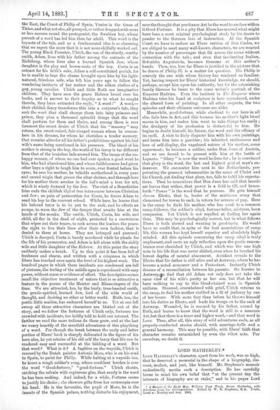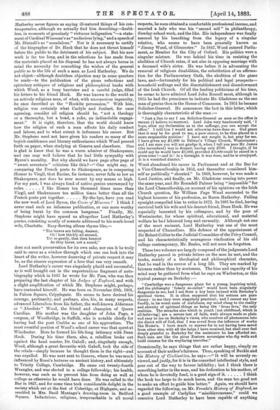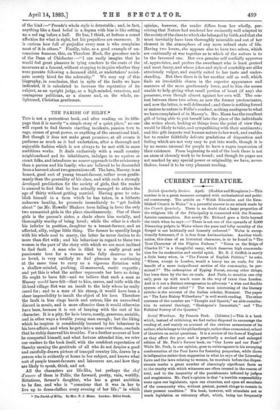LORD HATHERLEY.*
LORD H&TFIERLEY'S character, apart from his work, was so high, that he deserved a memorial in the shape of a biography, dis- creet, modest, and just, like himself. Mr. Stephens's memoir undoubtedly merits such a description. He has carefully borne in mind his own belief that " at the present day the interests of biography are at stake," and in his pages Lord • A Memoir of the Right Hon. William Page Wood, Baron Itatherley. with Selections from his Correspondence. Edited by W. II. Stephens, M.A. 2 role. London Bentley and Son. 1863„
Hatherley never figures as saying ill-natured things of his con- temporaries, although we actually find him describing—doubt-
less, in moments of genuinely " virtuous indignation "—a state- ment of Cardinal Wiseman's as "audacious lying," and a speech of
Mr. Disraeli's as " scandalous." Nor is it necessary to certify of the biographer of Dr. Hook that he does not thrust himself before the public to the detriment of his subject. But his new work is far too long, and in the selections he has made from the materials placed at his disposal he has not always borne in mind the necessity for consulting the wishes of the general public as to the life of such a man as Lord Hatherley. We do not object—although doubtless objection may in some quarters be made—to the publication of the pious reflections and
,epistolary critiques of religious and philosophical books with
which Wood, as a busy barrister and a careful judge, filled his letters to his friend Hook. He was known to the world as -an actively religions man, of what, with unconscious ingenuity, le once described as the " Hookite persuasion." With him, religion was certainly what Carlyle and Joubert, for once agreeing, consider all religion should be, " not a theology ior a theosophy, but a bond, a yoke, an indissoluble engage- ment." It is right, therefore, that the world should know -how the religion of such a man affects his daily conduct and labour, and to what extent it influences his career. But Mr. Stephens need not have given his readers so many of the boyish confidences and literary enthusiasms which Wood poured forth on paper, when studying at Geneva and elsewhere. One is glad is know that he was a warm admirer of Shakespeare, and one may well believe that he had little sympathy with Byron's morality. But why should we have page after page of
4` sweet seventeen" criticism like this?—" One might say, in -comparing the French poets to Shakespeare, as in comparing Homer to Virgil, that Racine, for instance, never falls so low as
Shakespeare, nor does he ever mount by any means so high. For my part, I was always fond of native genius uncramped by rules I like Homer ten thousand times more than Virgil, and Shakespeare ten million times better than all the
Wrench poets put together By-the-bye, have you read the new work of Lord Byron, the Curse of Minerva ? I think I
never read such an infamous publication, or one more worthy of being burnt by the common hangman." Finally, Mr.
.Stephens might have spared us altogether Lord Hatherley's poems, consisting mostly of sonnets addressed to his much-loved wife, Charlotte. Easy-flowing album rhyme like,—
" The leaves are falling, dearest,
Oh ! how thickly all around, Yet so gently, that thou hearest As they hover, not a sound,"
does not merit preservation for its own sake, nor can it be truly said to serve as a window through which one can look into the heart of the writer, however deserving of private respect it may "be, as the sincere expression of a love that ran very smooth.
Lord Hatherley's career was singularly placid and successful, as is well brought out in the unpretentious fragment of auto- biography which in 1863 he wrote for Mr. Foss, who was then preparing the last chapter of his judges of England, and with a slight amplification of which Mr. Stephens might, perhaps, have contented himself. He was born on November 29th, 1801,
in Falcon Square, Cripplegate. He seems to have derived his courage, pertinacity, and perhaps, also, his, in many respects, advanced Liberalism from his father, the well-known Alderman or " Absolute " Wood, the friend and champion of Queen Caroline. His mother was the daughter of John Page, a surgeon, of Woodbridge, in Suffolk, who is notable chiefly for having had the poet Crabbe as one of his apprentices. The most eventful portion of Wood's school career was that spent at Winchester. Here he formed his life-long intimacy with Dean Hook. During his time there, also, a rebellion broke out against the head master, Dr. Gabell ; and, singularly enough, Wood, although a great favourite with Gabell, took the side of the rebels—simply because he thought them in the right—and was expelled. He was next sent to Geneva, where he was much influenced by Rossi's lectures on ancient history, and ultimately to Trinity College, Cambridge. He came out twenty-fourth Wrangler, and was elected to a college fellowship; his health,
however, was such as to prevent him from doing so well at -college as otherwise he would have done. He was called to the Bar in 1827, and for some time took considerable delight in the society which sat at the feet of Coleridge, at Highgate, and as- sembled in Mrs. Basil Montage's drawing-room in Bedford Square. Industrious, religious, irreproachable in all moral respects, he soon obtained a comfortable professional income, and married a lady who was his " second self " in philanthropy,
Sunday-school work, and the like. His independence was finally assured by his benefiting from the legacy of a singular relative, who seems to have been generally known as "Jimmy Wood, of Gloucester." In 1847, Wood entered Parlia- ment, as Member for the City of Oxford. His politics were a singular mixture. He was behind his time in resisting the abolition of Church rates, if not also in opposing marriage with a deceased wife's sister. He was before it in advocating the removal of religions disabilities, the substitution of an affirma- tion for the Parliamentary Oath, the abolition of the game laws, and—fortunately for his political and legal prospects— household suffrage and the disestablishment and disendowment of the Irish Church. Of all the leading politicians of his time, he seems to have admired Lord John Russell most, although in 1855 he had the prescience to indicate Mr. Gladstone as the one man of genius then in the House of Commons. In 1851 he became Solicitor-General. He announces the fact in this letter, which is thoroughly characteristic of the man
Just a line to say I am Solicitor-General as soon as the office is vacant (I believe to-morrow). Lord John very handsomely said, I hope, after my declaration as to the suffrage, you can accept the office.' I told him I would not otherwise have done so. God grant that it may be for good to me, a poor sinner, to be thus placed in a more responsible position ! I have not sought it, but pray for me. I have given my £1,000 to Palmer's Village Church, Westminster ; and I am Bare you will not grudge it, when I tell you poor Mr. James (the incumbent) was in despair, having only £700. I thought, if he could say he would have £1,000, provided £4,000 could be raised in a given time !—and lo ! in a fortnight it was done, and he is overjoyed. It is a wretched district."
Wood abandoned his career in Parliament and at the Bar for a Vice-Chancellorship in 1852, and thereafter considered him- self as politically " shunted." In 1868, however, he was made a Lord Justice, and finally, on Mr. Gladstone coming into power the same year, and Sir Bounden Palmer being " impossible " for the Lord Chancellorship, on account of his opinions on the Irish Church question, Sir William Page Wood succeeded to the highest honours of his profession, as Baron Hatherley. Failing eyesight compelled him to retire in 1872. In 1881 he died, having survived both his wife and his dearest friend, Dean Hook. He was especially lamented by his colleagues, and by the poor of Westminster, for whose spiritual, educational, and material welfare he had laboured long and earnestly. Although not one of the most eminent, Lord Hatherley wail one of the most respected of Chancellors. His defence of the appointment of Sir Robert Collier to the Judicial Committee of the Privy Council, and his characteristically courageous vindication of his old college contemporary, Mr. Beales, will not soon be forgotten.
These two volumes are largaly composed of the judgments Lord Hatherley passed in private letters on the men he met, and the books, mainly of a theological and philosophical character, that he read in the course of a long life. They are marked by fairness rather than by acuteness. The bias and capacity of his mind may be gathered from what he says on Warburton, or this typical passage on Berkeley :—
" Cambridge was a dangerous place for a young, inquiring mind, and the philosophy falsely so-called' would have been singularly dangerous to me, had I not from a boy been imbued with Berkeley's spiritual views. It is often supposed that his notions are pare theory : to me they were singularly practical ; and I cannot say how fixedly, in its worst state of sinfulness, my mind clung to the reality and eternity of spiritual things as being the &nos gera,' the only realities. The miracles also which in youth [not childhood, which is all-believing] are a severe test of faith, were always made so plain and easy to me on Berkeley's views, who resolves all phenomena into the direct will of God, that I was saved from the influence of works like Hume's. I have much to answer for in not having been saved from other sins, with all the helps I have received, but shall ever feel deeply grateful to Berkeley for the assistance he has afforded me. Such men are like the pious Eastern sovereigns who dig wells and build cisterns for the wayfaring traveller."
Occasionally, be says things that are rather happy, simply on
account of their author's fairness. Thus, speaking of Buckle and his History of Civilisation, he says :—" It will be severely re- viewed, and justly, for it is in the conceited intellectual style, and goes out of the way to favour infidelity; but I think there is
something better in the man, and his dedication to his mother, of whom he is devotedly fond, is a good sign of it I think
the book too large to do much harm, and the man too good not to make an effort to guide him better." Again, we should have regarded the following, on Mr. Fronde's History of England, as a good example of Carlylian "mischievousness," could we
conceive Lord Hatherley to have been capable of anything of the kind i—" Froude's whole style is detestable ; and, in fact, anything like a fixed belief in a dogma with him is like setting up a red rag before a bull. He has, I think, at bottom a sound affection for what is right, but his prejudices are enormous. It is curious how full of prejudice every man is who complains most of it in others." Finally, take, as a good example of un- conscious humour, this, on Theodore Hook, the graceless uncle of the Dean of Chichester :—" I can easily imagine that he would feel great pleasure in tying crackers to the coats of the mourners at a funeral, without stopping to inquire whether they were parents following a deceased child, or undertakers' assist- ants merely hired for the solemnity." We may say of this biography, in conclusion, that in spite of the faults we have indicated, it is calculated to increase the reputation of its subject, as an upright judge, as a high-minded, veracious, and courageous politician, as a sincere and, on the whole, en- lightened, Christian gentleman.




































 Previous page
Previous page